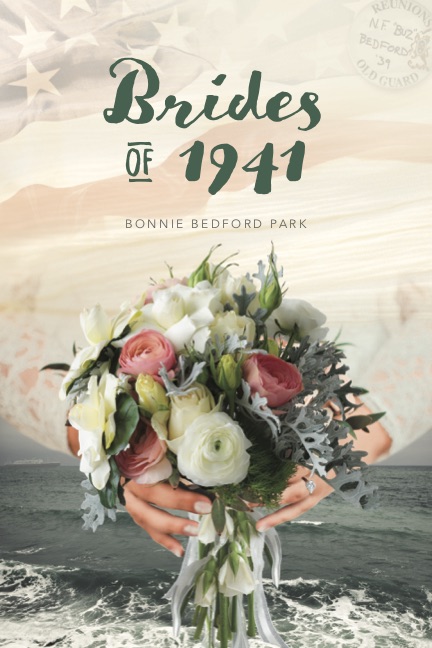Brides of 1941

When cleaning out the personal effects of members of the “Greatest Generation,” it’s fairly common to find boxes of letters. Short of pushing them to the back of another closet, what do people do with them? Some suggest to ceremoniously burn them and return their energy back to the universe. Tragically, others choose to declutter them straight to a dumpster. Fortunately, over the course of a few years, author Bonnie Bedford Park transcribed her family’s correspondence and created the book, Brides of 1941.
In February 1934, T. Wayne and Dr. Lelia Skinner leave their three children behind in North America. Lelia’s hand-wringing letters from “Campamento Americano,” the residential section of a Chilean mining camp, describe an over-worked existence. The Skinners commit to keep up with the expense of three college educations. It is through her candid correspondence Lelia opens the door to an authentic multi-general family saga.
Their eldest daughter, Roberta, lands on the campus of Smith College in 1937. Beaus who rank on Roberta’s “man-score” include a “townie,” several ivy leaguers, and a Montana cowboy. Over Christmas break 1939, in St. Pete, Florida, she dances with Buster Bedford, a Princeton “Tiger” graduate and Columbia Law School first year. As the Roosevelt administration strategically guides the nation toward U.S. involvement in WWII, Buster prepares himself for the effort while courting Roberta long distance. He implores her to join him in an uncertain future and presses for her hand.
The testimony of struggles, hopes, dreams, laughter, and fun of real people who are no longer with us fueled Park’s desire to share her parents’ letters. “At this moment in history, ‘We the People’ need to dig deep for hope and restoration of civility. I appreciate now more than ever the patient teaching moments of Roberta and Buster, and how they informed my values,” said Park. These lessons are universal. “We humans are often too quick to judge. This is why others may hide from uncomfortable conversations with family and friends that we can, and must, learn from,” continued Park. In the author’s case, anxiety, depression, and suicide were woven into the family fabric before mental health mattered enough to dominate headlines.
When asked how her ancestors might feel about her sharing their story in Brides of 1941 with the world, Park has this to say. “They may not like it, but I say it’s time for those skeletons to begin the conversation other American families might want to have.”
Buy Book From:
Reviews
- These letters took me right back to my father's stories of Amherst (Class of 44W*) and Smith pre-WWII. My own days at Smith included many of the same traditions from this era, perhaps most importantly, the cultivating of smart, creative, and independent women, which is the lifeline that connects all "Smithies." I felt a palpable connection to Bonnie’s mother through these letters.
--Beatrice Peck, B.A. Smith College (1974), J.D. University of Utah College of Law (1988), Business Attorney
- In a tribute to her parents, Bonnie Park weaves kindness, compassion and empathy into a well-researched piece of personal history. An inspiration for anyone who wishes to memorialize the joys and heartaches that formed the tapestry of one’s life.
--Jan McCosh, J.D., in House Counsel, Synergy Development
- This candid exposé reveals events leading up to one young man's weighty decision to join the Army National Guard in 1939. From that point, the die is cast for Nathaniel Forrest Bedford's WWII military career. A veteran to be remembered as one of Mountain Lakes, New Jersey's most memorable and decorated. I salute him and this true story of his early life and service.
--James L. Prescott, Navigator, USS Biddle (CG-34), 1977 – 1981
- I've known Bonnie Park as a remarkable and innovative community organizer and manager, but I never dreamed she had such a unique ability to write. She is a gifted researcher, historian and storyteller, and her Brides of ’41 a terrific tale.
--Sally Elliot, Elected Public Servant, Community Activist, Co-Chair Friends of Park City Ski Mining History.
- A true story told with spirited honesty, Bonnie Park shares the intimate past of her parents, Robin and Buster, but also owns up to her own personal history. She will have every Baby Boomer reminiscing about the wild times they survived in college during the 1970s.
--Joan Mills, owner, College Process Consulting and retired Guidance Counselor, Park City High School
About The Author
Listen to a Benny Goodman soundtrack while reading Six Weeks for Boatmail, and fully immerse yourself into a personal history of 1940’s family life in WWII America. Bonnie Park’s second book is an entertaining, wartime adventure across disparate continents. The intimate peek into her family's relationships reveal the War's societal limitations and beliefs that shape their lives... the author's untold narrative expertly melds history in tandem with the fates and fortunes of her patriotic family.Leslie Miller, Editor Reimagining A Place for the WildUpcoming Events
Press
When Bonnie Bedford Park discovered a box of letters that her parents and grandparents sent to each other back in the ...
Park City's local public radio station, KPCW, talks with Bonnie Bedford Park about her book, Brides of 1941, a family ...
